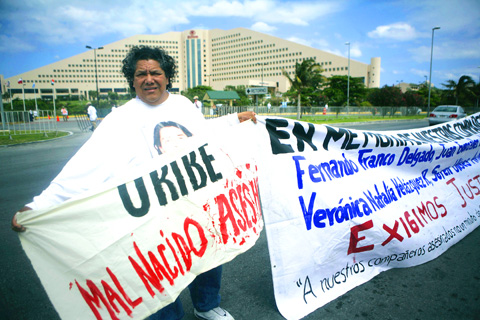Colombian President Alvaro Uribe said he doesn’t regret ordering a cross-border raid on a rebel camp in Ecuador, despite the deaths of four Mexican students there.
Uribe told Mexico’s Televisa network on Wednesday that the students were seen in a video with the guerrillas, which he said indicated that they were in league with the Revolutionary Armed Forces of Colombia (FARC).
“They were not doing humanitarian work. They were not hostages,” he said. “So why were they there?”

PHOTO: AP
“They were there as accomplices ... They were there as agents of terrorism,” he said.
Later on Wednesday, Mexican President Felipe Calderon asked Uribe not to jump to conclusions as to why the students were at the FARC’s camp until a thorough investigation had been conducted.
“I think it is prudent not to qualify or prejudge these youths’ activities,” Calderon said.
“Everyone has their own hypothesis but the pain of their relatives deserves the benefit of the doubt until an investigation is carried out,” he said.
The National Autonomous University of Mexico — where three of the dead and the survivor studied — said in a statement that Uribe’s comments were “baseless, imprudent and irresponsible.”
The other student who was killed attended Mexico’s Politecnico Nacional university.
Uribe’s comments thrust him headlong into a debate in Mexico about whether the students should have been at the guerrilla camp.
Many Mexican news commentators have said the students were supporters of the rebels. But the students’ families have denied they were involved with the FARC, saying they traveled to Ecuador for a leftist political conference before visiting the rebel camp for academic purposes.
The raid caused a crisis in relations between Colombia and Ecuador that has not yet healed. Ecuador cut off diplomatic ties following the attack.
Uribe on Wednesday reiterated his position that the attack was justified.
“I don’t regret it. In no way could I regret” carrying out the raid, Uribe said at the World Economic Forum on Latin America in Cancun, Mexico.
“It would have been ideal not to have had to bomb a [foreign] territory,” he said.

The Burmese junta has said that detained former leader Aung San Suu Kyi is “in good health,” a day after her son said he has received little information about the 80-year-old’s condition and fears she could die without him knowing. In an interview in Tokyo earlier this week, Kim Aris said he had not heard from his mother in years and believes she is being held incommunicado in the capital, Naypyidaw. Aung San Suu Kyi, a Nobel Peace Prize laureate, was detained after a 2021 military coup that ousted her elected civilian government and sparked a civil war. She is serving a

‘NO AMNESTY’: Tens of thousands of people joined the rally against a bill that would slash the former president’s prison term; President Lula has said he would veto the bill Tens of thousands of Brazilians on Sunday demonstrated against a bill that advanced in Congress this week that would reduce the time former president Jair Bolsonaro spends behind bars following his sentence of more than 27 years for attempting a coup. Protests took place in the capital, Brasilia, and in other major cities across the nation, including Sao Paulo, Florianopolis, Salvador and Recife. On Copacabana’s boardwalk in Rio de Janeiro, crowds composed of left-wing voters chanted “No amnesty” and “Out with Hugo Motta,” a reference to the speaker of the lower house, which approved the bill on Wednesday last week. It is

‘EAST SHIELD’: State-run Belma said it would produce up to 6 million mines to lay along Poland’s 800km eastern border, and sell excess to nations bordering Russia and Belarus Poland has decided to start producing anti-personnel mines for the first time since the Cold War, and plans to deploy them along its eastern border and might export them to Ukraine, the deputy defense minister said. Joining a broader regional shift that has seen almost all European countries bordering Russia, with the exception of Norway, announce plans to quit the global treaty banning such weapons, Poland wants to use anti-personnel mines to beef up its borders with Belarus and Russia. “We are interested in large quantities as soon as possible,” Deputy Minister of National Defense Pawel Zalewski said. The mines would be part

Cozy knits, sparkly bobbles and Santa hats were all the canine rage on Sunday, as hundreds of sausage dogs and their owners converged on central London for an annual parade and get-together. The dachshunds’ gathering in London’s Hyde Park came after a previous “Sausage Walk” planned for Halloween had to be postponed, because it had become so popular organizers needed to apply for an events licence. “It was going to be too much fun so they canceled it,” laughed Nicky Bailey, the owner of three sausage dogs: Una and her two 19-week-old puppies Ember and Finnegan, wearing matching red coats and silver